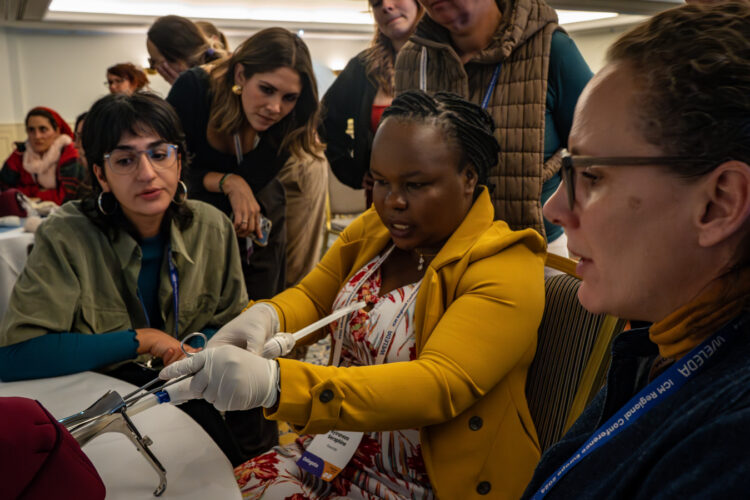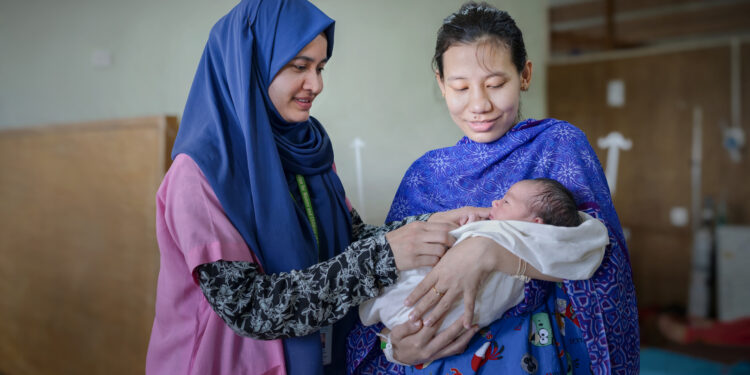Midwives’ Provision of Comprehensive Abortion Care

Background
Abortion management is required for both induced and spontaneous abortion, including missed abortion, pregnancy loss and intrauterine fetal death. Midwives play a key role in the provision of safe quality abortion care, offering pre-abortion assessment, information regarding treatment options, referrals, medication and procedural abortions, post-abortion and contraceptive care (1-3).
The provision of safe comprehensive abortion care services is crucial for the sexual and reproductive health (SRH) of women, girls and gender diverse people. Global estimates show that 61% of unintended pregnancies end in abortion, with 39 abortions per 1,000 women aged 15–49 years, totalling 73.3 million abortions annually (4), 45% of which are unsafe (5).
The prevalence of unsafe abortion has been shown to be higher in countries where restrictive abortion policies, stigma and the limited expansion of universal health coverage negatively impact on women’s access to comprehensive abortion care (2,4,6). Criminalisation of abortion does not reduce the number of women seeking abortions, but does dramatically reduce access to safe abortion services (2,4). Complications associated with abortion account for 8% of all maternal deaths (7) and one in four survivors of unsafe abortions suffer long-term health consequences, including internal organ injury, infertility and psychological trauma (6). Given that incorrect classification and underreporting of the causes of maternal deaths is an ongoing challenge globally (7), these statistics likely underestimate the true burden of mortality and morbidity associated with abortion, and in particular unsafe abortion practices performed by unqualified health professionals.
Access to safe abortion care significantly reduces maternal mortality and morbidity and is a sexual and reproductive right grounded in international human rights law (2). States are required to take a range of steps to protect women from unsafe abortion including a duty to liberalise restrictive policies and ensure timely access to quality care at the woman’s request (2).
An important step in increasing access is the removal of provider restrictions and the optimisation of workforce whereby midwives are enabled to provide comprehensive abortion care services as per ICM’s Essential Competencies for Midwifery Practice (3) and WHO Comprehensive Abortion Care Guidelines (2). Approaches to service delivery need to be dynamic and allow for a range of pathways to care, including support for self-care interventions which have the potential to increase access to services and empower and enhance women’s health (2,8). Self-management of abortion* reduces barriers related to travel, stigma, and concerns about privacy (2,9). Self-management of post-abortion contraception** can improve the continuation of contraceptive use (2).
During crises, midwives are often the only available health professionals for SRMNAH needs, and as such need to be competent in providing comprehensive abortion care to all women and gender diverse people who seek it.
In states that stigmatise, restrict and/or criminalise abortion, midwives and others who provide and enable access to abortion information, services and goods, are often exposed to hostility, physical and/or verbal attacks, threats, smears and intimidation. Some are criminalised through unjust prosecutions, investigations and arrests (10).
Position
A woman seeking abortion-related services is entitled to receive care from midwives. Care should be respectful and tailored to women’s needs; safeguarding rights to information regarding treatment options, to consent or refuse interventions, and safeguard dignity. ICM supports midwives working within their full scope of practice as providers of comprehensive abortion care services as outlined in the ICM Essential Competencies for Midwifery Practice (3) and WHO Abortion Care Guidelines (2).
Midwives who provide abortion information, services and goods have the right to carry out their work free from physical or mental harm, or fear from such harm, and must be protected by their employers, health and legal systems.
Recommendations
ICM urges policymakers to stop the criminalisation of health professionals who facilitate or provide abortion mediation and/or services, or who assist those seeking comprehensive abortion information and/or services.
ICM urges policymakers and all decisionmakers in facilities that provide maternity, sexual and reproductive care services to:
- Ensure laws and policies include measures that protect the right to work and right to privacy of midwives providing comprehensive abortion information and services.
- Optimise the midwifery workforce to enable midwives to work to their full scope of the Essential Competencies for Midwifery Practice, with appropriate referral systems for complications.
- Ensure that there is evidence- and rights-based information readily accessible on contraception and comprehensive abortion care.
ICM urges midwives’ associations to advocate for:
- Legalisation of abortion where it is criminalised, including the removal of sanctions against women, health workers, and accompaniers.
- Midwifery pre-service education and continuing professional development which ensures that midwives are equipped with the knowledge and skills needed to provide comprehensive, safe abortion care.
- Implementation of services offering the range of comprehensive abortion care methods as per WHO recommendations, including self-managed abortion.
- Improved access to essential medicines and supplies for comprehensive abortion care and contraceptive services.
- Accessible, timely abortion services, supporting women’s right to abortion care provided by midwives in all relevant settings.
- Interprofessional collaboration between midwives and obstetrician-gynaecologists to improve healthcare access and service user acceptability.
ICM urges policymakers and midwives’ associations to also address:
- Stigma surrounding sexuality, ensuring equitable access to contraceptives.
- Stigma surrounding unintended or mistimed pregnancy and abortion and its impact on women’s ability to seek, reach and receive comprehensive abortion care services.
- The impact of conscientious objection by healthcare providers on abortion services, ensuring that access to care is not undermined or impeded by lack of access to health professionals.
- Gender-based violence, its connection to unintended or mistimed pregnancy, and its impact on the physical, psychological, and cultural well-being of women, girls, and gender-diverse people.
ICM urges individual midwives to:
- Recognise comprehensive abortion care as part of midwifery practice within the framework of local laws and policies.
- Uphold a woman’s right to decide to have an abortion without mandatory counselling, waiting periods, or third-party authorisation.
- Provide human rights-based, woman-centred care, enabling informed decision-making for the woman’s needs.
- Refer women for further treatment outside midwifery practice when necessary.
- Offer emotional, psychological, and social support as required.
- Ensure privacy, confidentiality, and work to combat stigma surrounding SRH issues.
- Support and enable colleagues who provide comprehensive abortion care.
By ensuring midwives are suitably educated, advocating for legal reforms, and addressing systemic issues such as stigma and conscientious objection, member associations can improve access to safe, effective, and respectful abortion care for women, girls and gender-diverse people.
*Self-management of abortion (SMA) includes one or more of the following, self-assessment of eligibility for medical abortion, self-administration of medicines without the direct supervision of a health worker, and self-assessment of the success of the abortion process (< 12 weeks).
**Self-management of contraception may include ensuring access to oral contraception without a prescription and self-administration of injectable contraceptives
Related ICM Documents
References
- Fullerton J, Butler MM, Aman C, Reid T, Dowler M. Abortion-related care and the role of the midwife: a global perspective. Int J Womens Health. 2018 Nov 23;10:751-762. doi: 10.2147/IJWH.S178601. PMID: 30538585; PMCID: PMC6260173.
- Abortion care guideline. Geneva: World Health Organization; 2022. Licence: CC BY-NC-SA 3.0 IGO.
- International Confederation of Midwives. Essential Competencies for Midwifery Practice. 2024. Essential Competencies for Midwifery Practice | International Confederation of Midwives
- Bearak J, Popinchalk A, Ganatra B, Moller AB, Tunçalp Ö, Beavin C, Kwok L, Alkema L. Unintended pregnancy and abortion by income, region, and the legal status of abortion: estimates from a comprehensive model for 1990-2019. Lancet Glob Health. 2020 Sep;8(9):e1152-e1161. doi: 10.1016/S2214-109X(20)30315-6. Epub 2020 Jul 22. PMID: 32710833.
- Ganatra B, Gerdts C, Rossier C, Johnson BR Jr, Tunçalp Ö, Assifi A, Sedgh G, Singh S, Bankole A, Popinchalk A, Bearak J, Kang Z, Alkema L. Global, regional, and subregional classification of abortions by safety, 2010-14: estimates from a Bayesian hierarchical model. Lancet. 2017 Nov 25;390(10110):2372-2381. doi: 10.1016/S0140-6736(17)31794-4. Epub 2017 Sep 27. Erratum in: Lancet. 2017 Nov 25;390(10110):2346. doi: 10.1016/S0140-6736(17)32608-9. PMID: 28964589; PMCID: PMC5711001.
- Haddad LB, Nour NM. Unsafe abortion: unnecessary maternal mortality. Rev Obstet Gynecol. 2009 Spring;2(2):122-6. PMID: 19609407; PMCID: PMC2709326.
- Cresswell JA, Alexander M, Chong MYC, Link HM, Pejchinovska M, Gazeley U, Ahmed SMA, Chou D, Moller AB, Simpson D, Alkema L, Villanueva G, Sguassero Y, Tunçalp Ö, Long Q, Xiao S, Say L. Global and regional causes of maternal deaths 2009-20: a WHO systematic analysis. Lancet Glob Health. 2025 Mar 7:S2214-109X(24)00560-6. doi: 10.1016/S2214-109X(24)00560-6. Epub ahead of print. PMID: 40064189.
- WHO> Self-care for health and well-being. https://www.who.int/health-topics/self-care#tab=tab_1
- FIGO’s Self-Management of Abortion Project: FIGO Project. https://www.figo.org/what-we-do/figo-programmes/self-management-abortion-project
- Amnesty International. Key principles and actions to safeguard abortion care providers as human rights defenders. 2024. Key principles and actions to safeguard abortion care providers as human rights defenders – Amnesty International
Adopted at Glasgow Council meeting, 2008
Reviewed and adopted at Prague Council meeting, 2014
Reviewed and adopted at Virtual Council meeting, 2025
Due for Next Review: 2028
© 2025 by the International Confederation of Midwives
Detailed copyright information can be found here.
Suggested Citation: Midwives’ Provision of Comprehensive Abortion Care. The Hague: International Confederation of Midwives 2025.
Additional Translations / Traduções Adicionais
ICM’s materials and resources are officially available in our three working languages: English, Spanish, and French. As part of the Collaborate for Women, Abortion and Contraception Care Together Initiative, this resource has been translated into Portuguese. This is not an official ICM translation, and ICM is not responsible for the accuracy of the translation.
Os materiais e recursos da ICM estão oficialmente disponíveis em nossos três idiomas de trabalho: inglês, espanhol e francês. Como parte da Iniciativa Collaborate for Women, Abortion and Contraception Care Together, este recurso foi traduzido para o português. Esta não é uma tradução oficial da ICM, e a ICM não se responsabiliza pela precisão da tradução.
